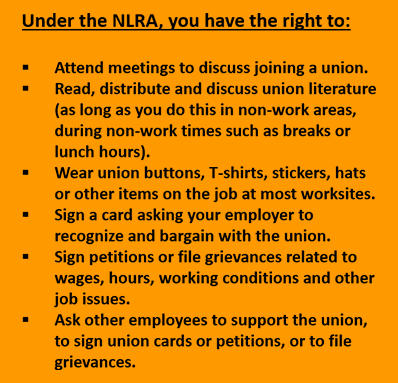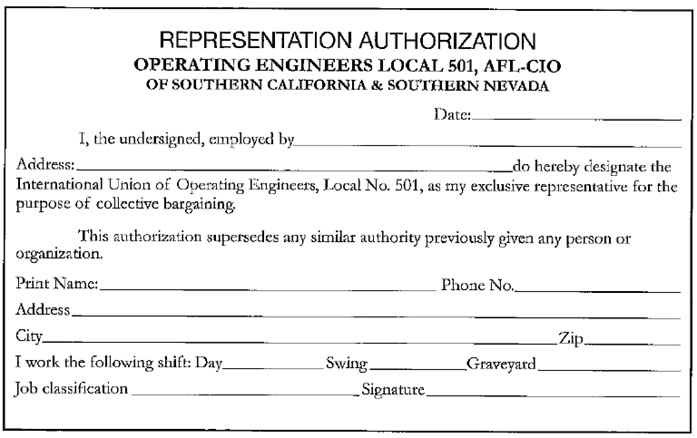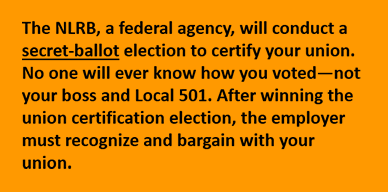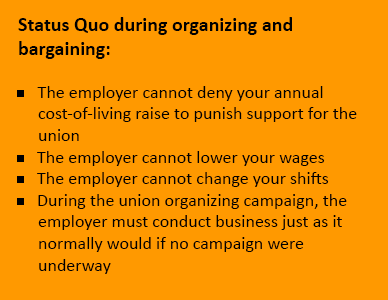Many workers at Wynn/Encore properties will have questions about organizing campaigns and the process of forming a union. This page will review the basics of organizing and discuss workers’ legal protections as they seek a union and a greater voice in the workplace. We also recommend that readers see our page about workers’ rights.
ORGANIZING BASICS
 Workers form a union in order to have a greater voice at work. Union organizing occurs from the bottom up when you join with your co-workers and friends to collectively demand your employer’s recognition in the workplace. The National Labor Relations Act (NLRA) ensures your right to collectively bargain with your employer and to form a union as your exclusive bargaining representative. Your union, as your bargaining representative, will use its resources and professional staff to help you negotiate with your employer and control the conditions and benefits of your work. The best organizers are workers themselves. The first step in organizing is to talk to your co-workers. What do you want your working life to be like? Do you share common concerns about your jobs? Does your job provide opportunities for professional growth and career advancement? Is your employer unwilling to discuss or address your concerns? You and your co-workers have already told the IUOE Local 501 about your interest in organizing. And because there is interest among workers at Wynn Resorts properties, Local 501 has begun reaching out to Wynn/Encore employees.
Workers form a union in order to have a greater voice at work. Union organizing occurs from the bottom up when you join with your co-workers and friends to collectively demand your employer’s recognition in the workplace. The National Labor Relations Act (NLRA) ensures your right to collectively bargain with your employer and to form a union as your exclusive bargaining representative. Your union, as your bargaining representative, will use its resources and professional staff to help you negotiate with your employer and control the conditions and benefits of your work. The best organizers are workers themselves. The first step in organizing is to talk to your co-workers. What do you want your working life to be like? Do you share common concerns about your jobs? Does your job provide opportunities for professional growth and career advancement? Is your employer unwilling to discuss or address your concerns? You and your co-workers have already told the IUOE Local 501 about your interest in organizing. And because there is interest among workers at Wynn Resorts properties, Local 501 has begun reaching out to Wynn/Encore employees.
AUTHORIZATION CARDS
Local 501 staff have heard your concerns and believe you will benefit from union representation. Therefore Local 501 staff have begun to distribute “authorization cards”. Employees are often misled by their bosses about the purpose of these authorization cards.
Authorization cards designate Local 501 as your representative for purposes of collective bargaining. Local 501 asks that all workers sign authorization cards as an indication of their support for the union. During standard NLRB union elections authorization cards are confidential. In fact, it is illegal for your employer to even ask you if you have signed a card during this organizing and NLRB election process.
Your employer may tell you that authorization cards give unions “a blank check” to do anything they want in your name. Or your boss may say that signing a card also entitles the union to start collecting dues money from you. You’d better “protect your signature,” bosses say. This is all untrue.
Signing an authorization card only indicates your support for Local 501. It gives organizers a count of pro-union members. And although authorization cards are completely confidential, the number of cards signed helps workers realize that they’re not alone in wanting union representation.
A sample authorization card is shown below. As you can see, it includes your name and contact information, as well as your job title at Wynn Resorts. Most of this information is available in an ordinary phone book. There is no Social Security Number or sensitive information about bank accounts, despite what your boss may say.

Signing an authorization card
• DOES NOT make you a member of IUOE Local 501; that happens after a successful election and contract negotiation.
• DOES NOT allow Local 501 to access your bank account (employers sometimes make this ridiculous claim).
• DOES NOT mean that you have to pay dues. In other recent unionization campaigns involving Local 501, dues began only after new members received a new union contract and substantial increases in wages and benefits.
NLRB ELECTION PROCESS
After 30 percent or more of Wynn/Encore engineers and slot techs sign authorization cards, Local 501 can file a petition with the National Labor Relations Board (NLRB). The NLRB is the government agency charged with enforcing the NLRA. With 30 percent or more of the signed authorization cards, Local 501 can ask the NLRB to conduct a secret-ballot election to determine whether a majority of you want to be represented by the union in order to negotiate a contract. A simple majority is required to win the election, and literally no one will ever know how you voted—not Wynn Resorts and not even Local 501.
 The organizing campaign does not let up after an election victory. The real goal of the campaign is a union contract—the document the union and the employer negotiate and sign, covering everything from wages to how disputes will be handled.
The organizing campaign does not let up after an election victory. The real goal of the campaign is a union contract—the document the union and the employer negotiate and sign, covering everything from wages to how disputes will be handled.
After winning the union certification election, the employer must recognize and bargain with your union. Local 501 will use its resources and professional staff to help you create and negotiate a contract with Wynn Resorts. In negotiations you will be represented by a “bargaining committee” made up of your co-workers who you will select. In conjunction with Local 501, the bargaining committee will draft a contract proposal to submit to Wynn Resorts at the start of negotiations. The bargaining committee will attend all negotiation sessions with the employer.
YOUR EMPLOYER MUST MAINTAIN THE STATUS QUO
In the run up to an NLRB election, your employer cannot discourage support for the union. This means that the employer may not mess with your wages, benefits, or working conditions as a means of intimidation or retaliation. In other words, your boss must maintain the “status quo”.
After authorization cards are signed and Local 501 files an election petition with the NLRB, a “status quo” environment is in effect for your workplace. Under status quo it is illegal for your employer to punish support for ongoing union activity by changing existing terms and conditions, wages, and benefits until the election is completed. Also, under status quo it is illegal for your employer to interfere with or intimidate employees in regard to the election.
 In other words, your boss cannot withhold something which normally would have been granted if the workers were not organizing. And your boss cannot grant something which normally would not have been granted if the workers were not organizing. In short, during a union organizing campaign, the employer must conduct business just as it normally would if no campaign were underway.
In other words, your boss cannot withhold something which normally would have been granted if the workers were not organizing. And your boss cannot grant something which normally would not have been granted if the workers were not organizing. In short, during a union organizing campaign, the employer must conduct business just as it normally would if no campaign were underway.
For example, this means your boss cannot make changes to your shift because you are suspected of favoring the union. Your boss cannot lower your wages either. Nor can your boss deny you a promotion for which you are suited because your boss suspects you favor the union.
Additionally, the employer cannot fail to pay a cost-of-living adjustment in 2015 to punish support for the ongoing union activity; withholding a cost-of-living increase would be illegal IF it is withheld in retaliation. Wynn Resorts has issued small wage increases for the last three consecutive years. Status quo requires that your employer continue with precedents previously set by the employer. As such, unless the employer can point to legitimate financial factors, the company would seem obligated to provide another cost-of-living increase in 2015. Bosses try to scare workers from organizing by threatening to stall the workers in years of contract negotiations. Bosses say that during this time workers will see no raises and inflation will diminish their salaries. But this is not likely to be the case because the employer has an established precedent of annual cost-of-living adjustments.
NLRB PROTECTIONS FROM YOUR EMPLOYER
The National Labor Relations Act (NLRA) ensures your right to form a union and to collectively bargain with your employer. Of course, during a union organizing drive your employer will try to convince you that forming a union is not in your or the company’s best interests. But after talking to Wynn/Encore engineers and slot techs, IUOE Local 501 believes you will benefit from union representation.
As you make your decision, the National Labor Relations Act provides you with specific protections from your boss. During a campaign, remember these helpful “No TIPS Rules”. Your boss is restricted from the following actions:
No Threats;
No Interrogations;
No Promises;
and No Spying
Under the NLRA, your employer cannot:
• Threaten employees with loss of jobs or benefits if they join or vote for a union or engage in protected concerted activity.
• Threaten to close the business operation if employees select a union to represent them.
• Question employees about their union sympathies or activities.
• Promise benefits to employees to discourage their union support.
• Transfer, lay off, terminate or assign employees more difficult tasks because they engaged in union or protected concerted activity.
Illegal intimidation includes a lot more than you may suspect. For example, it is illegal for your boss to ask you if you support unionization. It is also illegal for your boss to ask if anyone has signed an authorization cards. These actions are illegal because of the chilling effect they have on workers’ right to freely choose to unionize. Any violations like these may constitute an illegal offense, and in response Local 501 can file an Unfair Labor Practice (ULP) notice with the NLRB federal regulator. Workers who experience any treatment such as this or any treatment they suspect to be unfair or motivated by their union support are encouraged to speak with Local 501 representatives.
For more information, we also recommend that readers see our page about workers’ rights.